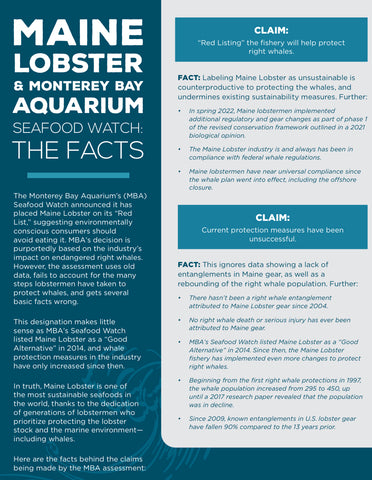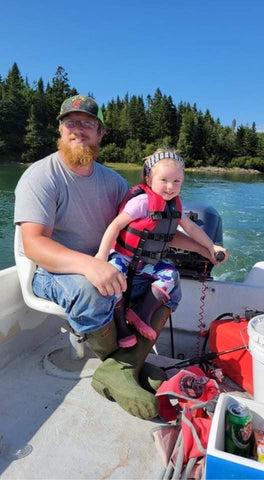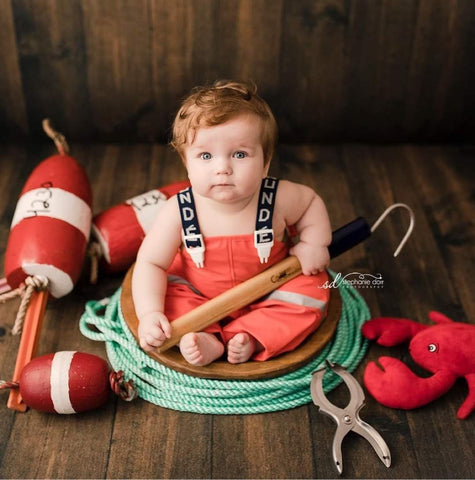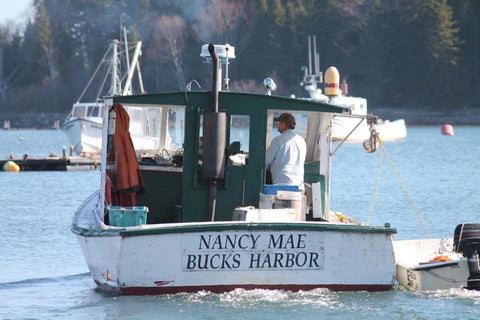A Way of Life at Risk
Author's Note: I make it a point to avoid topics of controversy and provide a space for mental relaxation, but I felt it dishonest to share our fishing village life with you while it stands under immense threat. Even if we disagree, I hope you can at least walk away with an understanding of our point of view. Please scroll to the end for the photo gallery. Thank you in advance, Lacie
Our teeny community has once again, somehow, found itself pushed to the center of attention. This is something we’d rather avoid - unless it’s for a rare blue lobster, or a visit from a Stellar’s Sea Eagle, the spotlight will get on just fine without us.
But this time the lobster fishing communities are under attack, falsely so, I firmly believe. The little boats hauling traps around the inlets and outlets of the Atlantic, as they have for generations, have been painted as butchers and cruel destroyers of nature recently by various groups with various motives.
Now, when you picture environmental plunderers at sea, you may think of giant container ships, plunging over every animal in their hurried path, or huge, sometimes illegal, vessels swallowing up or poisoning all creatures in the sea, keeping the lucrative ones and dumping the dead by-catch to rot.
Maybe you feel you’ve been lied to, that these picturesque nautical scenes of families on adorable boats with their bright green traps, pipes swinging from the corners of their mouths and saltwater spray dripping from their cheery yellow bibs, was all a concoction to get you to eat more lobster? I can assure you, nothing is further from the truth. I could regale you with facts and statistics about right whale entanglements in Maine, but great resources already exist for that information (the important number to remember is 0 whale deaths due to Maine lobstermen).
Why I am breaking my policy of only good and relaxing news, is to beg on behalf of my neighbors, friends, and family, that you see for yourself that we are not the enemies. Folks with suits and titles and money are leaning toward shutting down the industry entirely to save whales which ARE in trouble, however shutting down the lobster industry in Maine is not going to help the right whales one bit. It’s hard to tell whether the fishermen or the whales themselves are the scapegoats in this scenario, maybe both. Fishermen have self-regulated and worked to make their already environmentally-friendly practices even more sustainable, so that there has been 22 years since the last interaction, in which no whales died. But closing it all down is not going to improve whale entanglements, because they are already not happening in our waters.
It happened with the sardines. I have seen even in my lifetime, the fingerprints and the ghosts walking the crumbling streets of once-booming little towns, where the elderly remember and stay, but the youth have no choice but to leave. There is a deep sadness that pervades so many of these little villages, a subconscious longing for what’s been lost. Where a trade and hope of a future was once passed down through generations, now only this silent sense of bereavement. My mother and grandmother worked packing sardines; that industry is gone.
And have you ever seen the eerie lumber mill towns for yourself? Large buildings now stand empty: homes fallen into disrepair. Another industry, another option for the youth to get involved and feel like they’ve contributed to something while feeding their families, outsourced and shut down. Not so with the lobster industry - there is still so much life and strength in those families.
What I am saying is, we have so little left. Yes, tourism is now a big industry here, and I hope our visitors always come see us so we can share the lovely summers of Maine together. I have built my business on celebrating the unique, intertwined tradition of fishing and shepherding, and how good wool goes foot-in-boot with surviving in a harsh climate. I love sharing it because the culture we have here is a beacon of hope in the world, a connection to nature, and a spot of good news in a sea of so much bad. I encourage everyone to visit Maine at least once, not only for the scenic natural beauty, but for the authenticity that we all crave when we travel.
But there’s something that’s lost in a town, region, nation, when the only industry available, the only trade to invest yourself in, is serving wealthy visitors with a smile as you struggle to make ends meet at home, and then boarding up the town (often still marketed with the quaint appeal of the fishing trade that is no more) when they leave for the long, lonely winter.
What am I asking you to do? Well, maybe there’s not much we can do. Those with the motives to close down lobster fishing have a lot more money and power than any of us. But, you can know the truth. You can share the truth. You can eat lobster from fishermen. You could even say a prayer for us.
Links to relevant info: I highly recommend reading the Time Article if you're interested in learning more.
Maine Public: Federal Judge Strikes Down by Maine, Lobstermen
The Diplomat: Labor Exploitation, Illegal Fishing Continue to Plague the Asian Seas
Time: What Sustainable Seafood Activists Get Wrong About Maine's Lobster
NPR: Cannery's Closure Marks End to Way of Life in Maine
NOAA Right Whale Take Allowances for Wind Farms



Photo Gallery: Please enjoy these selections from our fishing and sheeping family.
Though it started long before him, Floyd and Maxine Colbeth were a fishing pair, and my grandparents. Floyd lived his first years on Cross Island between Bucks Harbor and Cutler, and built infamously sturdy wooden boats until he passed away from cancer.





My sister Candace and husband Jesse are another fishing couple, with their children Jack and Hazel.








PJ fishes out of Cutler and his wife Meghan, also a fisherwoman, helps with the yarn.


Neal Sprague helps us transport sheep to and from islands on the Nancy Mae.

Shepherds Turner and Emily load up this year's lambs from Metinic Island. Metinic Island has been a sheep island for over 350 years and is currently managed by farming friend Lee Straw.

My Dad and head shepherd:

My brother Travis proudly holds up a bug:


Lacie, never apologize for sharing facts and protecting what you love. Thank you so much for including the information from the Monterey Bay Aquarium, it’s a source I often refer to for my own fish and seafood purchases.
Crafters may fall into a ‘cottage industry’ or some other quaint category, but we are spread wide and network ferociously. Helping to educate us is to keep the momentum behind the movement. As a native of Detroit and now a resident of Michigan’s Upper Peninsula, there are so many terrible sites of blight and abandon in the name of progress. Let us never forget and take for granted the individual effort and tenacity that makes our cities and towns worth fighting for. Please, if we can help, you only need to ask.
In my family’s experience, this has also happened in the Midwest where family farms have been pushed out by huge agribusiness, and on the eastern shore of Maryland where canning factories were shut down by the development of frozen food by corporations. It leaves shells of communities behind. Pushing back, not only by the entire community, but also by all its allies, is necessary to stop this trend. We’re with you, Lacie.
In my family’s experience, this has also happened in the Midwest where family farms have been pushed out by huge agribusiness, and on the eastern shore of Maryland where canning factories were shut down by the development of frozen food by corporations. It leaves shells of communities behind. Pushing back, not only by the entire community, but also by all its allies, is necessary to stop this trend. We’re with you, Lacie.
Lacey, thank you for sharing your story. No apologies needed. We all must be able to speak up and share our stories. So many people everywhere are losing a way of life, losing their livelihood, losing what they’ve always known to those with big money and greed fueled agendas. I am so sorry for what is happening to you and your people in ME. The fisher people here in MI are also suffering due to pollution and over fishing.
Please know that through Maritime Family Fiber you are offering comfort, peace, and solace to many others.
No need to apologize for using your voice to make us aware. Who better to tell the story than one who experiences it firsthand.